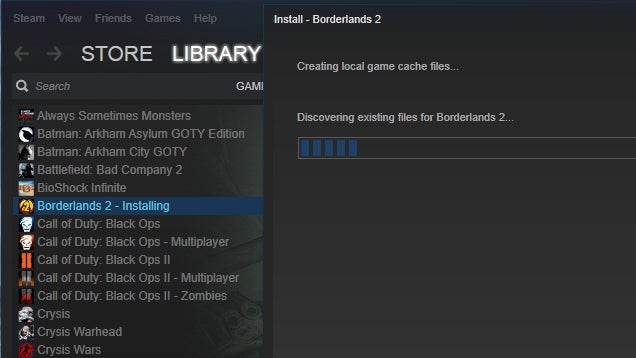Steam Game Files Location
- Steam Game Files Location Windows 7
- Change Steam Default Install Location
- Location Of Steam Game Files
Steam will move the game’s files to the other library location. To move other games, just repeat this process. When installing a game in the future, Steam will ask which library you want to install it to, but you should be able to move your games at any time. Fresh install. I got about 100 installed steam games, you know, in the computah. My problems is I have saves that I don't wanna lose, skyrim for one. Now I figure some games use cloud saving but not every game. My question is, are my saves for every game all in the Steamsteamappscommon folder?
Well, pretty much everything is in the title. Since the game doesn't use Steam Cloud, where can I find back the save files (containing my character's level, etc) ?
The smrconfig file located in C:UsersUSERNAMEAppDataLocalDemiurge StudiosShoot Many RobotsSOMEWEIRDINTEGER contains the player's configuration, but that's not exactly what I'm looking for. There's also a slot() file in the same folder, but the content isn't human readable.
Note that I've got the PC version, and bought it from Steam.
badp Anto
Anto2 Answers

After a few tests, it seems that the slot() file mentionned hereabove contains the character's data (level, equipment, unlocks, etc.)
So if you play on two different computers, you just have to copy/paste this file at the right location: C:UsersUSERNAMEAppDataLocalDemiurge StudiosShoot Many RobotsSOMEWEIRDINTEGER
This should install all the required dependencies for you.  Install and run the game DEBIAN AND DEBIAN BASED DISTRIBUTIONSIf you use a Debian based distribution (like Ubuntu), download the and install it. If your environment doesn't have a graphical package installer, you can install the package from the terminal, like this:apt-get install Minecraft.deb ARCH AND ARCH BASED DISTRIBUTIONSOn Arch and Arch based distributions, the package is available as from the AUR.
Install and run the game DEBIAN AND DEBIAN BASED DISTRIBUTIONSIf you use a Debian based distribution (like Ubuntu), download the and install it. If your environment doesn't have a graphical package installer, you can install the package from the terminal, like this:apt-get install Minecraft.deb ARCH AND ARCH BASED DISTRIBUTIONSOn Arch and Arch based distributions, the package is available as from the AUR.
Steam Game Files Location Windows 7
Run process monitor and set a process filter to the game's executable. Now you can watch every file the game touches.